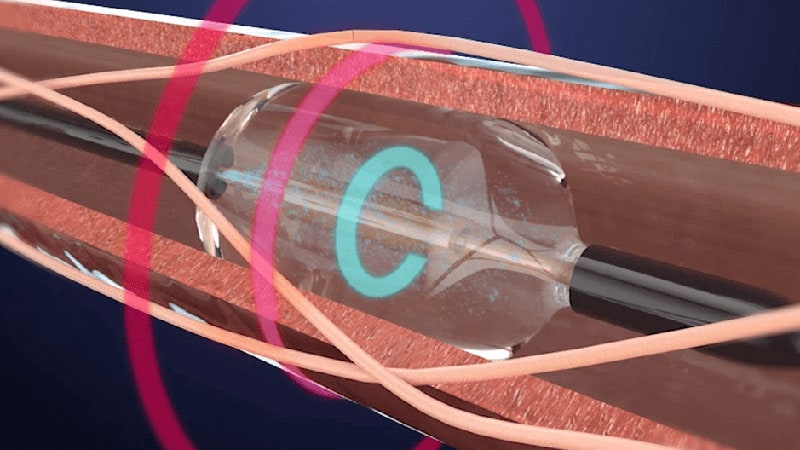ReCor Paradise Ultrasound Renal Denervation System FDA Panel Review
Core Concepts
ReCor Paradise Ultrasound Renal Denervation System deemed safe and effective by FDA panel.
Abstract
The FDA's Circulatory System Devices Panel reviewed the ReCor Paradise Ultrasound Renal Denervation (uRDN) System for adults with uncontrolled hypertension. The device is intended for renal arteries with specific diameters. While most panel members agreed on the device's safety, some expressed concerns about its long-term efficacy. Data from trials showed a significant initial drop in blood pressure, but the advantage diminished over time. The panel emphasized the need for further studies in specific subpopulations affected by hypertension.
ReCor Renal Denervation System Safe, Effective: FDA Panel
Stats
The device is intended for renal arteries with diameters of 3.0 to 8.0 mm.
Data from all three trials showed a significant drop in blood pressure with the device compared with pharmacologic therapy.
At 2 months, uRDN patients experienced significant reductions in systolic blood pressure compared with those treated with a sham device.
By 6 months, there was only a 1 mm Hg difference in blood pressure between the two groups.
Quotes
"The benefit is more short term, it is unclear what the long term benefit would be." - Benjamin Saville, PhD
"The sample size was small, but it is a novel tool to add to our tool box, and hopefully it will be used responsibly." - John Hirshfeld, Jr, MD
"Denervation is not superior to medications. It lowers blood pressure and is persistent, but when you can take the sham group to almost as good control as you get in the denervation group, that shows it can also be done with medicines." - John Somberg, MD
Key Insights Distilled From
by Fran Lowry at www.medscape.com 08-23-2023
https://www.medscape.com/viewarticle/995741
Deeper Inquiries
How can patient compliance impact the long-term efficacy of the ReCor Paradise Ultrasound Renal Denervation System?
Patient compliance plays a crucial role in the long-term efficacy of the ReCor Paradise Ultrasound Renal Denervation System. In the context of hypertension treatment, non-compliance with the prescribed regimen of medications or interventions can significantly impact the outcomes. In the case of the ReCor system, if patients are not compliant with follow-up appointments, lifestyle modifications, or medication regimens post-procedure, the initial benefits seen in blood pressure reduction may diminish over time. This lack of adherence can lead to a gradual return of elevated blood pressure levels, negating the positive effects of the renal denervation procedure. Therefore, patient education, support, and monitoring are essential to ensure sustained efficacy of the device in managing hypertension.
Is there a potential risk of over-reliance on medical devices over traditional pharmacologic therapy for hypertension?
While medical devices like the ReCor Paradise Ultrasound Renal Denervation System offer a novel approach to managing hypertension, there is a potential risk of over-reliance on such devices over traditional pharmacologic therapy. The data presented from the trials indicated that while the device initially showed significant reductions in blood pressure compared to pharmacologic therapy, the long-term benefits were not as pronounced. This suggests that medications still play a crucial role in managing hypertension effectively. Over-reliance on medical devices without considering the holistic approach to hypertension management, which includes lifestyle modifications and pharmacologic interventions, could lead to suboptimal outcomes. Therefore, a balanced approach that integrates both medical devices and traditional therapies is essential to effectively manage hypertension and reduce the risk of over-reliance on any single treatment modality.
How can patient-reported outcomes influence the future development of hypertension treatments?
Patient-reported outcomes (PROs) can have a significant impact on the future development of hypertension treatments by providing valuable insights into the patient experience, preferences, and treatment effectiveness. In the context of the ReCor Paradise Ultrasound Renal Denervation System, PROs can help researchers and clinicians understand how patients perceive the benefits and drawbacks of the procedure, including its impact on their quality of life, medication burden, and overall satisfaction with the treatment. By incorporating PROs into clinical trials and postmarketing studies, developers of hypertension treatments can tailor interventions to better meet patient needs and preferences. Additionally, PROs can guide the design of patient education programs, support services, and treatment protocols to enhance patient engagement, adherence, and long-term outcomes. Ultimately, by considering patient-reported outcomes, future hypertension treatments can be more patient-centered, effective, and aligned with the goals and preferences of individuals living with hypertension.
0
